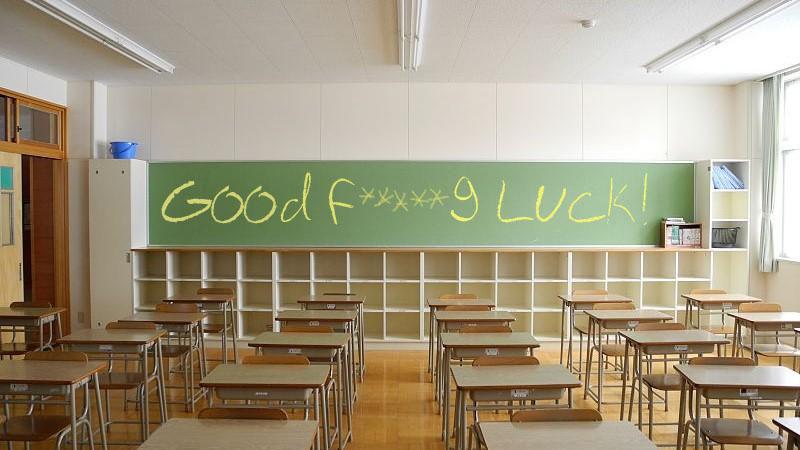Jorge Luis Borges’s story “The Lottery in Babylon” envisions a society in which every individual’s social position fluctuates according to the periodic drawings of a lottery. As the narrator summarizes his topsy-turvy trajectory: “Like all the men of Babylon, I have been proconsul; like all, I have been a slave.” Borges not only details the strange omnipotence of this random sorting mechanism, but also makes readers realize that for those living under the lottery, to question this omnipotence would be heretical. Only after having left his native city does the narrator “think with some bewilderment about the Lottery, and about the blasphemous conjectures that shrouded men whisper in the half-light of dawn or evening.”
Writer and academic Fredrik deBoer’s new book, The Cult of Smart, is a comparably “blasphemous” critique of the sorting mechanism that dictates the fates of the denizens of the contemporary United States. The education system, like Borges’s fictional lottery, is granted the power to determine status, wealth, and position; unlike the Lottery of Babylon, the results are permanent and irreversible. The twist is that this system presents itself as the opposite of a lottery. Its results, we are usually led to believe, are not random, but manifestations of the merit of those who participate. We are expected to see it as a system in which chance plays no essential part, such that when random accidents intervene, we regard them as distortions of the system rather than a basic feature.
Education is by definition a competitive system that sorts winners from losers. As long as we accept its role as a key determinant of social outcomes, the result will necessarily be inequality.
The “reform” agenda that has long dominated education policy has been a series of futile attempts to resolve the contradiction between the supposed elimination of chance from the system and its persistent role in determining outcomes. The problem, reformers claim, is that many students have the bad luck of being trapped in school districts that hinder their potential. They propose to counter the impact of such misfortune by introducing “choice.” Rather than being stuck in the district they happen to live in, students can opt into better schools.
Yet chance persists as a factor. For one thing, ironically enough, the selection process by which students exercise “choice” often involves literal lotteries. Charter schools, one of the key elements of the education reform project, in many cases randomize their admissions process, sometimes by state mandate. And as critics of reform often point out, other accidents of fate impinge on this process. Inevitably, students from impoverished backgrounds and those with weaker family support structures are far less able to take advantage of the options on offer.
But according to deBoer, there is a deeper sense in which chance intervenes in a system nominally premised on its exclusion. This is “genetic lottery”: the significant degree to which, he argues, academic talent is innate and heritable. For deBoer, the refusal to factor natural talent into discussions of school proceeds from a denial of basic experiential reality as well as reams of empirical evidence. The justifications for this denial differ by political persuasion. School reformers from the center and right dismiss assertions of variation in student ability as mere “excuses” for the failings of school systems, while those on the left associate discussion of genetically determined intelligence with racist pseudoscience. Both sides agree that “[t]o speak of natural talent . . . is to permit some students to be left behind.” The problem is that current approaches, which dismiss its relevance, are already leaving many students behind. The bipartisan project of expanding educational opportunity over the past several decades has failed to improve the overall situation of the disadvantaged: economic equality and social mobility have declined even as high school graduation and college attendance rates have increased.
For deBoer, there are various reasons for this failure, but one is that students do not start from the same baseline of intellectual ability. Even if certain broad outcomes are leveled out, a system that determines success based on talent will find other ways to place those with higher levels of it at an advantage. To be clear, he categorically rejects claims of innate group (racial and gender) differences in intelligence. Instead, his emphasis is on individual variations in academic talent across all groups, meaning that it is possible to imagine a world in which “the number of students from various demographic categories in the upper echelons of performance matches their numbers in society writ large.” But as he notes, this would still be a highly unequal world, since “the lower half of the distribution will still represent half of our students.”
Much like a lottery, education is by definition a competitive system that sorts winners from losers. As long as we accept its role as a key determinant of social outcomes, the result will necessarily be inequality, and it will merely be a question of how this inequality is distributed by group. Those who insist that education is “the great equalizer,” deBoer argues, are either being dishonest or are suffering from the Lake Wobegon delusion that all children can be above average. As he writes: “not everyone can be a good student if the term ‘good’ has any meaning.” One proof of this is that as soon as some educational sorting mechanism ceases to effectively separate “good” from “bad” students, its much-vaunted benefits evaporate.
For instance, high school diplomas lost much of their labor market advantage as graduation rates increased, a fact ignored by policymakers who cite the higher average earnings of college graduates to support the idea that increasing access to higher education is a way to flatten the economic playing field. As deBoer notes, “sending everyone to college is a recipe for eroding the very advantage that college now confers.” This is because “educated labor is like other goods: its value is subject to supply and demand. The more people that possess educational credentials, the easier it is for employers to hire educated labor, and the more competition there is within the educated class.” The “great equalizer” view of education, when applied to labor market competition, leads to a perverse outcome: a workforce with weaker bargaining power overall. This is a desirable outcome for employers but not for employees, which is surely part of why expanding educational access is such a popular cause among the CEO class.
A conventional retort to an argument like deBoer’s is that the goal is not “equality of outcomes” but “equality of opportunity.” Politicians and reformers often claim that the system should ensure that all students have the same possibility of success. Right-of-center reformers argue that the main hindrance to this aim lies with the bad schools some students are stuck with, while left-of-center reformers cite the effects of poverty and home environments; their respective prescriptions target these causes. But for deBoer, again, both positions have the same blind spot: they assume that all students have the same underlying level of ability. The reality of the “genetic lottery,” he argues, exposes “equality of opportunity” as a fraudulent goal.
In effect, if not in theory, recent education reforms from No Child Left Behind to the Common Core to various local school choice initiatives have aimed to help the same subgroup: academically gifted students who, as a result of poverty, historical discrimination, and other factors, cannot access the same paths to success as their privileged counterparts. Left out of the discussion entirely, on the other hand, are “meritocracy’s losers”: those who simply lack the talent and disposition to succeed in school, regardless of circumstances. Policy discussions either ignore these students, or else reframe their inborn inability to succeed as a lack of effort, thus retroactively justifying their failure in a game they would never be able to win.
This blind spot is not accidental: it is essential for sustaining the “moral justification of the edifice of meritocracy.” After all, as deBoer says, “[n]o one chooses who their parents are, no one can determine their own natural academic abilities, and a system that doles out wealth and hardship based on academic ability is inherently and forever a rigged game.” Traditional conservatives with an attachment to natural hierarchy might find a way to accept such a system. But deBoer’s point is that it’s incompatible with the supposed liberal-left consensus in favor of equality.
By refusing to acknowledge innate ability, progressives who may be nominally critical of meritocracy leave its ideological underpinnings unchallenged. To question universal capacity to succeed in school, they believe, is to deny the equal worth of all people. But this is only true if we accept the false premise of the Cult of Smart: “the notion that academic value is the only value, and intelligence the only true measure of human worth.” If we reject this premise, conversely, we must also reject a system that adjudicates economic outcomes based on it. After all, deBoer asks, “[w]ho would endorse meritocracy if ‘merit’ depends so heavily on chance?”
The idea that meritocracy is largely an alibi for a new “aristocracy of the talented” is common enough in recent social critiques. However, most other critics of meritocracy, like most advocates of school reform, assume that the goal should be to create a fairer meritocracy. But as deBoer points out, once we accept that “our place within the modern meritocratic economic sorting machine is profoundly influenced by our genes, which we can’t control,” it’s hard to imagine a system “crueler than an actual meritocracy.” In such a system, low-status people would be told they deserve their position for no reason other than their heritable traits.
Having rejected “equality of opportunity” as a myth premised on a denial of the natural distribution of talents, deBoer goes to bat for the oft-derided notion of “equality of outcomes.” While “variation between individuals will inevitably result in inequality,” he argues that “equality of certain essential outcomes related to material security and political representation is a realizable and noble goal.” Some of his concrete proposals do not address education per se, but the decommodification of essential goods to ensure universal access to them, regardless of success in the meritocratic rat race. For instance, he spends seven pages advocating for Medicare for All. In some ways, this is a questionable choice. The UK, which has the sort of nationalized health care system deBoer advocates, also has a high level of economic inequality which, as in the US, correlates with education. Its poorer citizens are far less likely to be bankrupted by health care costs, but they’re evidently still victims of the Cult of Smart.
As for education itself, deBoer’s proposed reforms may appear contradictory to many readers. On one hand, he argues that “school quality simply doesn’t matter very much when it comes to quantitative educational outcomes,” and is similarly skeptical of the dramatic claims made about the benefits of pre-k and afterschool programs. Since a large portion of academic ability is innate, as he argues, education simply can’t affect outcomes all that much. Here, surprisingly, deBoer appears to concur with conservative libertarian Bryan Caplan, who argues that school is mainly a mechanism for signaling attributes to employers, rather than improving student ability. But while Caplan concludes from this that education funding should be reduced, deBoer argues the opposite: that public schools should be funded robustly, as should free pre-k, afterschool programs, and college. The basis for this, he claims, should not be any particular educational outcomes, but a “societal commitment to ensuring the wellbeing of everyone.”
The well-funded pre-k through college educational system deBoer envisions would differ from the current one in that it would no longer be defined by cutthroat competition. Standards would be loosened, the dropout age would be reduced to 12, and students would be under no pressure to attend college if they preferred not to. Of course, as he acknowledges, the hindrances to such reforms are broad and multifaceted. It’s not theoretically difficult to imagine an economy in which students can enjoy comfortable lives without finishing college or even high school: the US economy was like that not too many decades ago. But achieving such a situation would of course require a transformation of the economic system as a whole.
As for what this transformation would look like, deBoer scrutinizes proposals for Universal Basic Income and Jobs Guarantee. He isn’t fully persuaded, but says he is “not remotely as opposed to either as I am to the poverty-and hopelessness-filled status quo.” His ultimate aim, he tells us, is socialism, but rather than “articulate exactly what a socialist society would look like,” he confines himself to sketching out “what the path through life [might] look like under socialism.”
The section of the book devoted to outlining the resulting changes in the school experience largely imagines the current system without the things that now guarantee a great deal of misery and failure: standardized testing, strict graduation requirements, and competitive admissions. Beyond that, he imagines that high school students could “pursue independent studies with teachers, or . . . take advantage of expanded vocational and technical programs” and that as a college student, “you dedicate yourself to whatever intellectual pursuits you choose.”
In this way, deBoer gestures towards the self-directed learning advocated by the “unschooling” movement and some varieties of critical pedagogy, but he does not offer much detail on what the alternative approach might look like. The book could have benefited from engagement with literature of unschooling, which at its most interesting proposes radical alternatives to the one-size-fits-all model of schooling which most take for granted, and which deBoer argues should be preserved up until high school. With schools in crisis due to the COVID pandemic, it is as good a time as any to rethink education more fundamentally than deBoer attempts to do. Moreover, in the absence of a comprehensive effort to reimagine schooling, deBoer’s proposal for minimal-standards universal public education, if actually implemented, might risk creating a massive babysitting program that serves little purpose other than keeping kids off the streets. At worst, the result would be a dismal holding pen for the children of the disadvantaged, since those who could place their children in better situations would surely do so.
It’s unclear that even a broad abandonment of the ideology that deBoer attacks would fully uproot the discriminatory processes it sustains.
The limitations of deBoer’s proposals stem from the fact that “[t]he Cult of Smart is . . . deeply entangled with the economic system in which it arose.” It is the ideology of the ruling class of the “knowledge economy,” which enables this class to morally justify its position as gained through merit rather than good fortune. As he states, “if we’re to truly kill the Cult of Smart, we must begin to rewrite the basic economic contract of our society.” This statement points to an ambiguity in the book’s project. If “base determines superstructure,” as deBoer argues, then revealing that our social sorting system is no less cruel and irrational than Borges’s Babylonian lottery does nothing to alter the material factors that perpetuate its dominance.
In other words, it’s unclear that even a broad abandonment of the ideology that deBoer attacks would fully uproot the discriminatory processes it sustains. Traditional justifications of hereditary privilege were discredited long ago, but as we all know, that has not made hereditary privilege go away. Comparably, the rejection of certain forms of meritocratic ideology might preserve or further stratify unequal outcomes. Consider recent moves to abolish the SAT requirement for college admissions. This change will spare students who struggle with standardized tests an ordeal, but it doesn’t put meritocracy’s perpetual winners in a worse position, since they have other ways to signal their academic promise (including the optional submission of SAT scores).
If the advantages of the academically gifted are tied to the value assigned to certain skills in the knowledge economy, the only way to weaken these advantages would be to restructure the economy to reward other skills. But deBoer’s proposals do not extend in this direction. Instead, he seems to propose that we keep the education lottery basically intact, but make playing optional and lower the stakes of winning and losing. In this sense, he does not differ that much from pro-meritocracy advocates of Universal Basic Income, like Andrew Yang, who want to ensure that those left behind by hi-tech capitalism are not totally immiserated. This similarity makes clear that mitigating the harms of meritocratic sorting could in fact justify its continued dominance. As long as the values of the knowledge economy’s ruling class remain hegemonic, deBoer’s proposals would not prevent the system from continuing to create a permanent underclass, even if the average economic situation of that class was less dire than it is now.
DeBoer describes The Cult of Smart as a “prayer for the untalented”: an effort to advocate for those with little academic ability or inclination, whose interests have been left out of education policy proposals from across the political spectrum. However, he ends up presenting “meritocracy’s losers” more as potential beneficiaries of government largesse than as active political agents. This is connected to the book’s lack of attention to proposals for a fundamental overhaul of what education looks like. The problem with education is not only that it reproduces inequality, but as critical pedagogical theorists have argued, that it forms the passive subjects the economic system needs to perpetuate itself. The knowledge economy’s underclass is not only materially immiserated: it is (understandably) politically disengaged and disempowered. Compensating for the effects of the educational reification of the genetic lottery does not address this problem of political subjectivity, but a radical rethinking of school could be a start.









